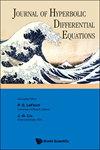T上动力学DNLS的Cauchy问题的适定性
IF 1.1
4区 数学
Q4 MATHEMATICS, APPLIED
引用次数: 2
摘要
我们考虑环面上[公式:见文]的动力学导数非线性Schrödinger方程[公式:见文]的柯西问题,其中常数[公式:见文]使得[公式:见文]和[公式:见文],而[公式:见文]表示希尔伯特变换。该方程具有耗散性质,能量法适用于Sobolev空间中Cauchy问题的局部适定性证明[公式:见文]。然而,由于希尔伯特变换的存在,规范变换技术不能直接适用于处理非线性中的导数损失[公式:见文本]。特别是对于低正则性空间的局部适定性和柯西问题的全局可解性,目前还没有研究结果。本文将在[公式:见文]、[公式:见文]中证明小初始数据下柯西问题的局部和全局适定性。为此,我们利用非局部非线性项的共振部分产生的抛物型平滑效应[公式:见文],除了通常的三次非线性非线性Schrödinger方程的色散型平滑效应外。作为证明的副产品,我们还得到了前向时正则化和后向时不适定性的结果。本文章由计算机程序翻译,如有差异,请以英文原文为准。
Well-posedness of the Cauchy problem for the kinetic DNLS on T
We consider the Cauchy problem for the kinetic derivative nonlinear Schrödinger equation on the torus [Formula: see text] for [Formula: see text], where the constants [Formula: see text] are such that [Formula: see text] and [Formula: see text], and [Formula: see text] denotes the Hilbert transform. This equation has dissipative nature, and the energy method is applicable to prove local well-posedness of the Cauchy problem in Sobolev spaces [Formula: see text] for [Formula: see text]. However, the gauge transform technique, which is useful for dealing with the derivative loss in the nonlinearity when [Formula: see text], cannot be directly adapted due to the presence of the Hilbert transform. In particular, there has been no result on local well-posedness in low regularity spaces or global solvability of the Cauchy problem. In this paper, we shall prove local and global well-posedness of the Cauchy problem for small initial data in [Formula: see text], [Formula: see text]. To this end, we make use of the parabolic-type smoothing effect arising from the resonant part of the nonlocal nonlinear term [Formula: see text], in addition to the usual dispersive-type smoothing effect for nonlinear Schrödinger equations with cubic nonlinearities. As by-products of the proof, we also obtain forward-in-time regularization and backward-in-time ill-posedness results.
求助全文
通过发布文献求助,成功后即可免费获取论文全文。
去求助
来源期刊

Journal of Hyperbolic Differential Equations
数学-物理:数学物理
CiteScore
1.10
自引率
0.00%
发文量
15
审稿时长
24 months
期刊介绍:
This journal publishes original research papers on nonlinear hyperbolic problems and related topics, of mathematical and/or physical interest. Specifically, it invites papers on the theory and numerical analysis of hyperbolic conservation laws and of hyperbolic partial differential equations arising in mathematical physics. The Journal welcomes contributions in:
Theory of nonlinear hyperbolic systems of conservation laws, addressing the issues of well-posedness and qualitative behavior of solutions, in one or several space dimensions.
Hyperbolic differential equations of mathematical physics, such as the Einstein equations of general relativity, Dirac equations, Maxwell equations, relativistic fluid models, etc.
Lorentzian geometry, particularly global geometric and causal theoretic aspects of spacetimes satisfying the Einstein equations.
Nonlinear hyperbolic systems arising in continuum physics such as: hyperbolic models of fluid dynamics, mixed models of transonic flows, etc.
General problems that are dominated (but not exclusively driven) by finite speed phenomena, such as dissipative and dispersive perturbations of hyperbolic systems, and models from statistical mechanics and other probabilistic models relevant to the derivation of fluid dynamical equations.
Convergence analysis of numerical methods for hyperbolic equations: finite difference schemes, finite volumes schemes, etc.
 求助内容:
求助内容: 应助结果提醒方式:
应助结果提醒方式:


